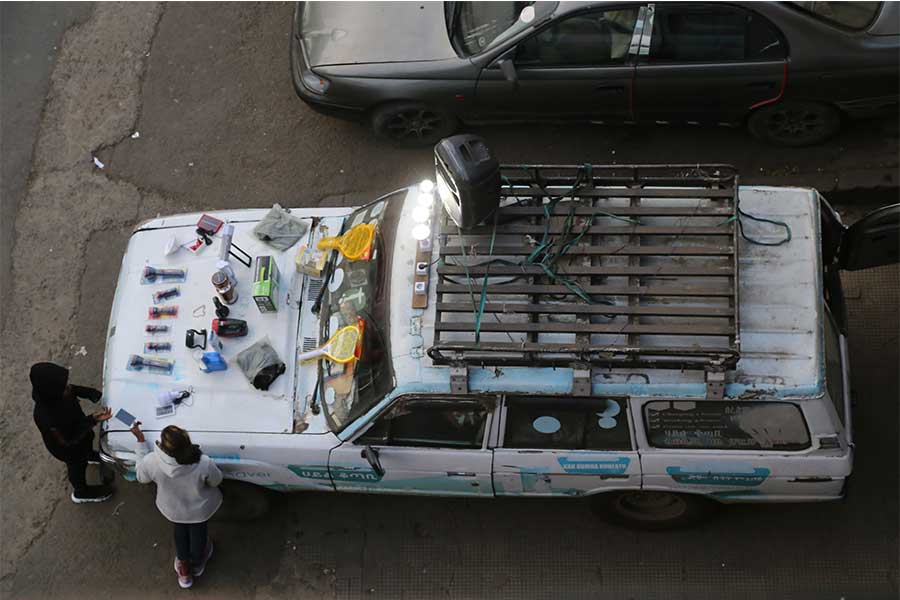
Fortune News | Apr 04,2020
A 2002 graduate of Neqmet Technical & Vocational Education Training College and an advanced diploma holder in electronics and electricity, Sileshi Simahunde, 38, was full of hope and optimism after graduation.
He left his birthplace in Wollega, Oromia Regional State, and transplanted himself to Gilgel Gibe seeking work opportunities with the construction of Gilgel Gibe II hydroelectric power station. He secured a job as a day labourer and staying there for two years.
When the work ended, he moved to Addis Abeba looking for employment opportunities. Things did not turn out very well for him in the capital, and his effort to gain employment was frustrated for several months. Then he heard about an opportunity working as a contract labourer with the then Ethiopian Electric Power Corporation (EEPCO). The job paid 20 Br a day, and the employer was hiring on the basis of a rolling 15-day temporary contract, which was renewed without any lapses.
He took the job in 2005 thinking it would be a temporary job to help him get back on his feet. But Sileshi settled with his new job and worked for nearly 14 years both at the Sebeta Electric Utility Service Centre and the West Addis Abeba District Office.
Sileshi's salary grew incrementally from 20 Br a day to the current 120 Br, allowing him to start a family. His contractual arrangement with the state-owned electric company remained unaltered, and his status as a contract labourer continued.
Meanwhile, EEPCO went through multiple reforms and changes. Six years ago, the electric company split into two: Ethiopian Electric Power (EEP), the power generator; and Ethiopian Electric Utility (EEU), the power distributor, and Sileshi was retained by EEU under the same contractual agreement.
About two weeks ago, the unexpected happened to the father of two. On the morning of April 9, 2019, Sileshi arrived to work only to be told by the district manager that his contract has been terminated and that EEU was no longer hiring contract labourers.
Sileshi is one of 800 labourers in four of Addis Abeba Electric Utility’s district offices and 41 service centres who found themselves dismissed by the utility company and left unemployed.
The contract termination of these workers was a result of institutional reforms adopted by EEU, according to Bekele Kifle, communications manager at the Addis Abeba City Electric Utility.
Executives of the utility company explain that the institution has been undergoing reforms since the beginning of this fiscal year to address public dissatisfaction with its services.
"We've identified electric distribution, construction and maintenance as the hottest issues in our services and as major sources of public frustration," reads a report, 'Ethiopian Electric Utility Reform and Good Governance Plan for 2018/2019.' The report continues, "we found out that there were major ethical problems and lack of good governance."
Decentralisation of services by outsourcing; reforming human resources and the financial system; and adoption of automation and technology were identified as a way out for the problems, according to the report.
With only 10pc of the workforce reportedly classified as permanent employees in the department, residents in some areas are already complaining about a lack of maintenance service. An electric pole in Gerji collapsed, causing a power outage in the area.
Tariff adjustments were made by the utility to increase the fee by fourfold in three years a few months ago. It is to be noted, however, that the tariff adjustment did not apply to 1.5 million subscribers that consume 50KW or less of electric power a month.
As part of its reforms, the electric utility outsourced the distribution, construction, operation and maintenance work to third parties, ousting hundreds of contract labourers like Sileshi.
"Outsourcing was done to make the institution effective and efficient in its operation," said Melaku Taye, communications director at EEU, which generated 3.2 billion Br in revenue during the first half of the current fiscal year.
Financial inequities within its workforce were also advanced as the other reason for ousting the contract labourers.
Sileshi and his colleagues were receiving 90 Br to 120 Br a day, while permanent employees, including meter readers are paid 40 Br a day, according to Melaku.
The executives of the Utility, which has 2.9 million subscribers, claim that the day labourer positions existed as a result of institutional failures that were continuously abused.
"The termination of contract day labourers was necessary to change the image of the utility," Melaku told Fortune.
Accordingly, EEU issued a new directive that outsourced distribution, construction, operation and maintenance work to organised groups. The directive opened the door for terminated labourers to be organised, and decreed that the work will be paid on the basis of the volume of work that the group accomplishes.
But this was a devastating move to the terminated workers who viewed the action by the utility as undermining their interests and legal rights. Additionally, they say the decision overlooks the fact that the contract labourers are being discharged without any compensation, despite their employment by the utility for many years, some for as long as two decades.
"It is such a shame to be treated like worthless burdens by an institution that we built with our backs and sweat," said Seleshi.
Even though they are offered continued work by forming organised groups, Seleshi and his friends claim that they cannot do so, arguing that they do not have the financial wherewithal and material capacity to perform the work.
"The work requires vehicles, equipment and tools, which we cannot procure," said Temesgen Wendmneh, a representative of the terminated workers.
They also cite the uncertainty of the nature of employment as a reason for declining to accept the new offer.
"There are no new electric distribution lines that are being installed in the city, and the work will be limited to maintenance, which will not enable us to feed our families," said Sileshi.
Fraol Temesgen, a senior electrical engineer in the contract administration office of South Addis Abeba District, argues that the new scheme may pay much better.
But he says that the institution failed to communicate the new changes to the terminated contract labourers properly.
The utility argues that the terminated workers were advised and that they had held multiple discussions with them, according to Melaku.
However, the labourers claim that the issue of outsourcing was raised only once in a meeting and was met with severe opposition.
"As the utility did not raise the matter again, we thought the plan was abandoned," said Temesgen.
The contract workers were terminated without any compensation, despite years of service employed by the utility, an issue that has rattled many of them.
EEU employs around 15,200 permanent staff with an additional 8,000 contract workers, a figure that does not include the contract labourers among its employee list, and the basis for the utility's claim that they are not permanent employees, and therefore not entitled to compensation.
"Day labourers are hired to do a specific job and when that job ends their employment ends," said Melaku, although their contracts were renewed by the utility continuously, some spanning for two decades.
The labour union of the utility that lists 9,000 members is unable to intercede on behalf of the contract labourers, since they are not members of the union.
Mehari Redae (PhD), a lecturer at Addis Abeba University and an expert in labour law, argues that the daily workers are entitled to equal treatment as the permanent employees.
Mehari points out that EEU should pay the same benefits and compensation as its permanent employees to the contract workers.
"The institution has applied workforce reduction according to the law. Thus, it has to compensate the laid off contract labourers," he said.
Some of the terminated workers have embarked upon a different route than pursuing a legal remedy - taking their grievances to various government offices and filing complaint letters.
Since the beginning of last week, some of the terminated labourers have started working under the new outsourcing arrangement at the South Addis Abeba District Office, according to Fraol.
Some other workers have sued the utility in the courts, and their case is under judicial review. Still others have filed complaint letters with the Addis Abeba Electric Utility Office, EEU and the Ethiopian Institution of the Ombudsman.
The fate of Seleshi, who supports a family of four, hangs on the balance after his termination by an institution that he served for 14 years.
"I'll sue the institution together with the other day labourers," he said. "We will continue our fight."
After all, the effect of the contract termination will continue, according to Fraol.
In the department of the utility that deals with distribution, construction, operation and maintenance work, only 10pc of the workforce is classified as permanent employees, according to Fraol.
"There is a shortage of manpower, and the city will soon feel the effect of the utility's action," he told Fortune.
Residents around the Summit area in Bole District have already started suffering from lack of service. Electricity was off in the area for a seven-day stretch following an incident where an electric pole in the area fell in a traffic accident on April 7, 2019.
The maintenance team showed up to fix the problem after a seven-day delay following the accident, according to residents who requested to remain anonymous.
PUBLISHED ON
Apr 20,2019 [ VOL
20 , NO
990]

Fortune News | Apr 04,2020

In-Picture | May 25,2019

Radar | Jun 08,2019

Radar | Nov 16,2024

In-Picture | Oct 19,2019

Radar | Oct 09,2021

Radar | Mar 16,2019

Fortune News | Apr 13,2024

Radar | May 25,2024

Fortune News | Apr 10,2021

Dec 22 , 2024 . By TIZITA SHEWAFERAW
Charged with transforming colossal state-owned enterprises into modern and competitiv...

Aug 18 , 2024 . By AKSAH ITALO
Although predictable Yonas Zerihun's job in the ride-hailing service is not immune to...

Jul 28 , 2024 . By TIZITA SHEWAFERAW
Unhabitual, perhaps too many, Samuel Gebreyohannes, 38, used to occasionally enjoy a couple of beers at breakfast. However, he recently swit...

Jul 13 , 2024 . By AKSAH ITALO
Investors who rely on tractors, trucks, and field vehicles for commuting, transporting commodities, and f...

Sep 13 , 2025
At its launch in Nairobi two years ago, the Africa Climate Summit was billed as the f...

Sep 6 , 2025
The dawn of a new year is more than a simple turning of the calendar. It is a moment...

Aug 30 , 2025
For Germans, Otto von Bismarck is first remembered as the architect of a unified nati...

Aug 23 , 2025
Banks have a new obsession. After decades chasing deposits and, more recently, digita...